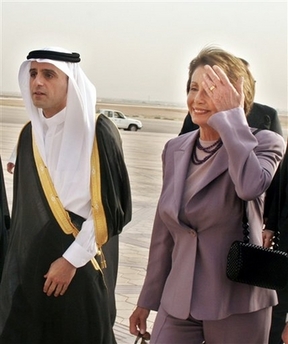Pelosi arrives in Saudi Arabia
(AP)Updated: 2007-04-05 18:21
RIYADH, Saudi Arabia - Speaker of the House Nancy Pelosi continued her Mideast tour Thursday, a day after coming under sharp attack from the Bush administration for meeting with Syria's leader.
 US House Speaker Nancy Pelosi adjusts her hair as she is accompanied by Adel Al-Jubeir, left, Saudi ambassador to Washington, upon her arrival in Riyadh, Saudi Arabia, Wednesday, April 4, 2007. [AP]  |
She met with Saudi King Abdullah when she first arrived in the kingdom Wednesday and was meeting Thursday with several members of the Shura Council, an unelected advisory assembly named by the king.
The Bush administration accuses Syria of backing Hamas and Hezbollah - two groups it deems terrorist organizations - and has rejected direct talks with Damascus until its changes its ways.
"Unfortunately that road is lined with the victims of Hamas and Hezbollah, the victims of terrorists who cross from Syria into Iraq," said Gordon Johndroe, a spokesman for President Bush's National Security Council. "It's unfortunate that she took this unilateral trip which we only see as counterproductive."
The Bush administration also says Syria is fueling Iraq's
violence by allowing Sunni insurgents to operate from its territory and is
destabilizing Lebanon's government.
Pelosi was the highest-ranking American politician to visit Syria since
relations began to deteriorate in 2003. Then-Secretary of State Colin Powell
went to Damascus in May 2003.
She was accompanied by a delegation of five congressional Democrats and Ohio Republican Dave Hobson. Their meeting with Assad included a lunch in Damascus' historic Old City.
In an interview with ABC News, Cheney said Assad has "been isolated and cut off because of his bad behavior and the unfortunate thing about the speaker's visit is it sort of breaks down that barrier."
"It means without him having done any of those things he should do in order to be acceptable, if you will, from an international standpoint, he gets a visit from a high-ranking American anyway," Cheney said.
Pelosi's spokesman Nadeam Elshami responded to Cheney by saying Pelosi pressed Assad on issues of concern.
"The administration has rejected the bipartisan recommendations of the Iraq Study Group to engage Syria and instead continues to engage in a war of words with Republicans and Democrats on this issue," he said from the Saudi capital, Riyadh, where the delegation met Wednesday evening with Saudi King Abdullah.
Last year, the Iraq Study Group - chaired by former Republican secretary of state James Baker II and former House Democrat Lee H. Hamilton - recommended Washington open talks with Iran and Syria to try to resolve the war in Iraq and other regional crises.
Bush rejected the recommendations. But in February, the US joined a gathering of regional diplomats in Baghdad that included Iran and Syria for talks on Iraq.
Since 2005, Washington has succeeded in largely isolating Damascus, with its European and Arab allies shunning Assad. The last high-ranking US official to visit Syria was then-Deputy Secretary of State Richard Armitage in January 2005.
Relations between the US and Syria reached a low point in early 2005 when Washington withdrew its ambassador to Damascus to protest the assassination of Hariri.
But that isolation has weakened in recent months, with some European officials and a number of American lawmakers - Republicans and Democrats - visiting Damascus.
|
||
|
||
|
|